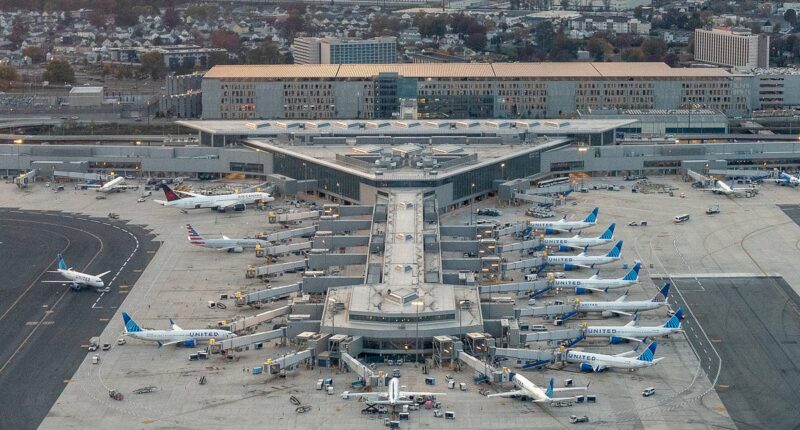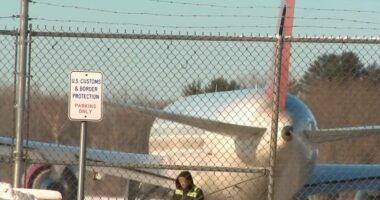Share this @internewscast.com
Airports across the United States are grappling with yet another wave of flight delays and cancellations this Monday, primarily due to a shortage of staff.
Key airports such as Harry Reid International in Las Vegas, as well as Scottsdale Airport, Phoenix Deer Valley, Phoenix-Mesa Gateway, and Chandler Municipal near Phoenix, are facing significant disruptions because of staff shortages linked to the ongoing government shutdown.
This staffing crisis in the Southwest is causing a ripple effect across the nation. The Federal Aviation Administration (FAA) has issued warnings that nearly all major flight routes in the U.S. are experiencing departure delays.
Regions including the West Coast, Midwest, and East Coast are all feeling the impact of the delays originating from the staffing issues in the Southwest.
The FAA has indicated that these disruptions are expected to continue from 10:30 AM ET until at least 5 PM on Monday, potentially impacting thousands of flights nationwide.
Due to the shortage of air traffic controllers in Arizona and Nevada, the number of flights permitted to take off has been capped at 12 per hour. This restriction is likely to cause average delays of about 34 minutes per flight, with some flights experiencing waits of up to nearly three hours.
According to Flight Aware, over 1,700 flights into and out of the US have been cancelled Monday, with Chicago, New York, Boston, and Phoenix being among the hardest hit regions.
Southwest Airlines has been the most affected carrier, with more than 1,000 flights delayed and over 270 cancelled.

Newark Liberty Airport in New Jersey (Pictured) is among dozens of airports affected by the slowdown in flights caused by the government shutdown

Air traffic controller shortages have led to a domino effect of delays and cancellations throughout the US during the shutdown
Hartsfield-Jackson Atlanta International Airport, the nation’s busiest airport, has experienced the highest number of cancelled landing at the travel hub, as more than 140 flights into the Georgia airport have been cancelled Monday.
Chicago’s O’Hare International Airport has seen nearly as many flights cancelled due to the combination of staffing issues and an early season winter storm blanketing the area.
The FAA has also warned that ground stops due to staffing issues have been planned for Newark Liberty International Airport in New Jersey and Ronald Reagan Washington National Airport in Virginia this afternoon.
Dozens of other major airports have also grounded all private jets and charter flights Monday, including in Atlanta, Boston, Chicago, Dallas, Denver, Los Angeles, New York, and Washington DC.
The FAA and US Department of Transportation has said airline cancellations will continue to grow each day until the government shutdown officially comes to an end and air traffic controllers return to work.
The growing delays and cutdown in flights are part of a coordinated ground stop program by the federal government to prevent overcrowding in US airspace.
It’s a temporary cap on departures to keep things safe and manageable because there aren’t enough controllers available to handle the usual volume of planes taking off across America.
Although air traffic control tower workers are considered essential employees and required to work without pay during the government shutdown, Transportation Secretary Sean Duffy has noted that many have called out sick over the last month.

Over 2,000 flights have been cancelled on Monday, including more than 1,700 into or out of the US (Stock Image)
On Tuesday, the next stage of the government’s rolling flight cancellations is set to go into effect if a deal to reopen the government is not completed.
Last week, the FAA unveiled a plan to begin cancelling domestic flights at 40 of the country’s busiest airports, with major airlines forced to ground four percent of their scheduled trips over the weekend.
That number is set to grow to six percent on November 11, representing over 2,000 flights tomorrow.
If the government shutdown continues beyond Tuesday, the FAA’s plan then calls for an increase to eight percent of domestic flights cancelled on Thursday, November 13, potentially axing roughly 2,800 flights nationwide.

















